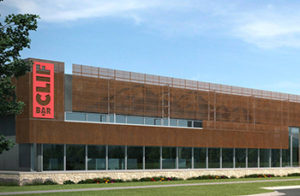Clif Bar Celebrates Opening of $90 Million Sustainable Factory

TWIN FALLS, Idaho — On Aug. 30 Clif Bar & Company officially celebrated the opening of its $90 million factory and bakery in Twin Falls that integrates sustainable features with biophilic design to help increase feelings of happiness, reduce stress and enhance productivity.
Construction began April 1, 2015 and light construction and landscaping projects are still taking place at the bakery. Later this fall, the bakery will begin the third phase of construction, which is slated for completion in spring of 2017.
The facility’s general contractor is Boise, Idaho-based Stock Construction Management Services and the architect is Salt Lake City-based Babcock Design Group.
The new 300,000-square-foot bakery includes more than 200 windows, vaulted skylights, light-directing solatubes, indoor walls of recycled barnwood and natural stone, indoor plants and sliding doors that connect an auditorium to an outdoor events space. A packaging area without exterior windows offers wall-projected images of the natural outdoor scenes that on a daily basis.
Outside the factory, Clif Bar planted drought tolerant, native plants, including more than 570 trees and 5,700 shrubs and grasses. Slated for the near future is a footpath and organic community garden.
“This is the first bakery and manufacturing facility of any kind in the nation that I know of to incorporate biophilic features from the outset,” said Bill Browning, a founding partner of New York-based Terrapin Bright Green, design consultants for the design phase of the project in a statement. “We’ve seen biophilia designed into offices, hospitals and schools in the United States, but never as an upfront design strategy in this sector.”
“It was really important to us that our Twin Falls bakery embodied our company values,” said Clif Bar CEO Kevin Cleary in a statement. “We wanted it to be a healthy, welcoming place for people to work, a workplace that sustains our people, the community and the planet.”
The bakery’s green building design elements include a set of hybrid cooling towers that use a third less water than most conventional bakeries. LED lighting, a reflective roof and a water source heat pump help the bakery use about 20 percent less energy than most conventional bakeries. Energy-efficient refrigeration equipment and processes trim approximately 40 percent off typical bakery refrigerant emissions, according to a statement from Business Wire.
In addition, 100 percent of the electricity required to power the bakery is generated from green, renewable energy through the purchase of Renewable Energy Credits (RECs) from an Idaho wind farm.
